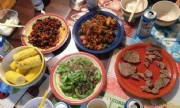机械工程专业熔模铸造英语翻译
机械工程专业出国留学申请除了要达到所申请学校的语言要求,还要有较好的专业知识,并且能够有英文熟练的表达这些专业知识,下面金东方留学小编整理了机械工程专业标尺尺寸方面的常用的,面试的时候能用的到的英语表达方式,希望对计划出国读机械工程专业的童鞋们有所帮助。
熔模铸造
Investment casting is also known as the lost wax process. This process is one of the oldest manufacturing processes. The Egyptians used it in the time of the Pharaohs to make gold jewelry (hence the name Investment) some 5,000 years ago.
熔模铸造也称为失蜡加工。这是最古老的制造工艺之一。大约在5,000年前的法老王时代,埃及人就用它制造黄金饰品(因此而得名投资)。
Intricate shapes can be made with high accuracy. In addition, metals that are hard to machine or fabricate are good candidates for this process. It can be used to make parts that cannot be produced by normal manufacturing techniques, such as turbine blades that have complex shapes, or airplane parts that have to withstand high temperatures.
复杂的形状能被高精度地制造。另外较难机加工或制作的金属都能用此工艺。它还能用于生产一般制造技术无法生产的零件,例如有复杂形状的涡轮叶片或必须耐得住高温的飞机零件。
The mold is made by making a pattern using wax or some other material that can be melted away. This wax pattern is dipped in refractory slurry, which coats the wax pattern and forms a skin. This is dried and the process of dipping in the slurry and drying is repeated until a robust thickness is achieved.
制作铸型的型模采用石蜡或其它一些能被融化掉的材料做成。石蜡型模浸泡在耐热浆里,让它覆盖型模并形成外壳,然后使其变干。重复这个浸泡、变干的过程直至获得足够的厚度。
After this, the entire pattern is placed in an oven and the wax is melted away. This leads to a mold that can be filled with the molten metal. Because the mold is formed around a one-piece pattern (which does not have to be pulled out from the mold as in a traditional sand casting process), very intricate parts and undercuts can be made.
完成后把整个型模放在烤箱里融化石蜡。这样就做成了能填充熔化金属的铸型。由于这种铸型是环绕整块型模形成的(无需像传统的砂型铸造工艺那样拔模),能制作十分复杂的零件和浮雕。
The wax pattern itself is made by duplicating using a stereo lithography or similar model—which has been fabricated using a computer solid model master.
石蜡型模本身能用立体制版或类似的模型复制—这可以采用计算机立体模型原版制作。
The materials used for the slurry are a mixture of plaster, a binder and powdered silica, a refractory, for low temperature melts. For higher temperature melts, sillimanite or alumina-silicate is used as a refractory, and silica is used as a binder.
对较低熔化温度而言,用于耐热浆的材料是石膏作粘合剂和用粉末状硅石作耐温材料的混合物。对较高熔化温度而言,则采用硅线石或氧化铝硅酸盐作耐温材料、无水硅酸作粘合剂。
Depending on the fineness of the finish desired additional coatings of sillimanite and ethyl silicate may be applied. The mold tTs produced can be used directly for light castings, or be reinforced by placing it in a larger container and reinforcing it more slurry.
根据最后所需光洁度也可采用硅线石和乙烷基硅酸盐。这样生成的铸模可直接用于薄壁铸件或通过将其放在较大容器内用更多耐热浆加强。
Just before the pour, the mold is pre-heated to about 1,000℃(1,832℉) to remove any residues of wax, harden the binder. The pour in the pre-heated mold also ensures that the mold will fill completely.
在正要浇铸之前,将型模预热到约1,000℃(1,832℉)以去除剩余石蜡、硬化粘合剂。在预热的型模中浇铸也能保证型模完全充满。
Pouring can be done using gravity, pressure or vacuum conditions. Attention must be paid to mold permeability when using pressure, to allow the air to escape as the pour is done.
浇铸可采用重力、压力或真空条件来实现。当使用压力时必须注意渗透性,以便在浇铸的同时让空气逸出。
Tolerances of 0.5% of length are routinely possible, and as low as 0.15% is possible for small dimensions. Castings can weigh from a few grams to 35kg (0.1oz to 80lb), although the normal size ranges from 200g to about 8kg(7oz to 15 lb). Normal minimum wall thicknesses are about 1mm to about 0.5mm(0.040~ 0.020 in.) for alloys that can be cast easily.
一般公差可能为长度的0.5%,小尺寸可能低到0.15%。虽然通常尺寸的铸件重量范围为200g到约8kg(7oz到15lb),但实际可从几克到35kg (0.1oz to 80lb)。对容易铸造的合金而言,通常壁厚约为1mm到0.5mm(0.040~ 0.020 in.)。
The types of materials that can be cast are aluminum alloys, bronzes, tool steels, stainless steels, stellite, hastelloys, and precious metals. Parts made with investment castings often do not require any further machining, because of the close tolerances that can be achieved.
可以用于铸造的材料类型有:铝合金、青铜、工具钢、不锈钢、钨铬钴合金、镍基合金和贵金属。采用熔模铸造的零件常常不需要进一步加工,因为熔模铸造能达到精密的公差。










